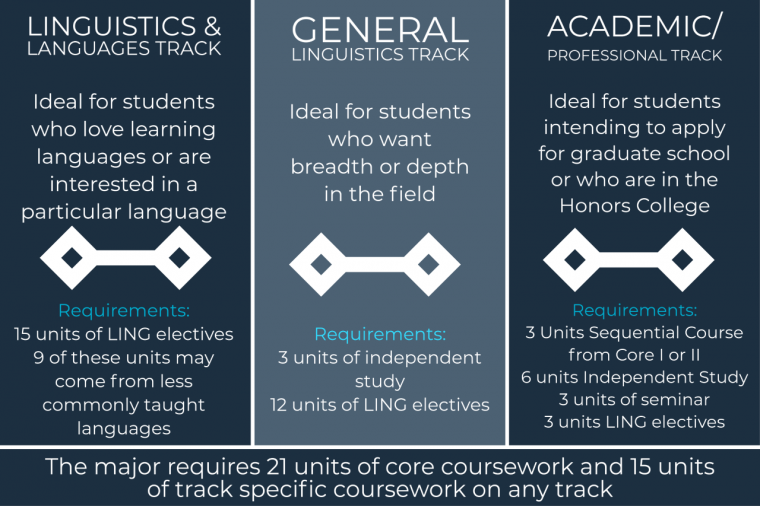About the Major
Linguists approach the study of language as a cognitive science from a variety of perspectives: biological, computational, educational, experimental, socio-cultural, and theoretical, among others.
This interdisciplinary approach is not only essential to a comprehensive understanding of language, but means that students may choose from a number of different sub-fields on which to focus during their undergraduate career, for example:
- phonetics (the study of speech sounds)
- syntax (the study of sentence structure)
- psycholinguistics (how language is learned and processed in the brain)
- computational linguistics (language and computers)
- language revitalization (the preservation and maintenance of indigenous languages)
- sociolinguistics (the study of language in society)
Degree Requirements
Students must complete the General Education and other degree requirements applicable to the College of Social and Behavioral Sciences and an additional 36 or 39 units of major coursework depending on the year admitted (admit terms Fall 2022 and later require 39 units). Consult our online program guide for more information about the degree and courses.
Core I (15-18 units)
The remaining Core I courses should be taken after LING 201 with the exception of LING 320, which does not have LING 201 as a prerequisite. If you want to know where to start, start with LING/PSY 201 (in-person or online).
The remaining Core I courses should be taken after LING 201 with the exception LING 320. We recommend that students take no more than two Core I courses at the same time starting with LING 300 and LING 314.
Core II (6 units)
Take two courses from any of the following areas (courses do not have to come from the same area).
LING 388 - Language and Computers
Fundamentals of processing of natural language and computational linguistics.
LING 408 - Computational Techniques for Linguists
Students are introduced to computer programming as it pertains to collecting and analyzing linguistic data. The particular programming language is chosen at the discretion of the instructor.
LING 438 - Computational Linguistics
Fundamentals of formal language theory; syntactic and semantic processing; the place of world knowledge in natural language processing.
LING 439 - Statistical Natural Language Processing
This course introduces the key concepts underlying statistical natural language processing. Students will learn a variety of techniques for the computational modeling of natural language, including: n-gram models, smoothing, Hidden Markov models, Bayesian Inference, Expectation Maximization, Viterbi, Inside-Outside Algorithm for Probabilistic Context-Free Grammars, and higher-order language models.
LING 478 - Speech Technology
Topics include speech synthesis, speech recognition, and other speech technologies. This course gives students background for a career in the speech technology industry.
LING/AIS 104A/B (Diné Bizaad (Navajo language))
LING 204A/B - Intermediate Diné Bizaad (Navajo language)
Continuation of vocabulary development, oral skills enhancement and mastery of Diné Bizaad (Navajo language) verb paradigms. Native speakers undertake original research and writing in Diné Bizaad.
LING 210 - American Indian Languages
This course surveys American Indian languages and the communities that speak them, focusing on a representative sample for closer study. The role of language in maintaining cultural identity is examined, and prospects for the future of American Indian languages are assessed.
LING 307A/B - Elementary O'Odham Language
LING 421 - Language Maintenance, Preservation and Revitalization
This course examines potential ways to avert the massive language endangerment and death the world is experiencing. A variety of approaches and methods are considered, including linguistic documentation, teaching language courses, immersion (pre)schools, and the master-apprentice program. The course also covers ethical issues, goals of communities, and the balance between linguists and communities.
LING 341 - Language Development
Introduction to theory and research on language development, with emphasis on word learning and grammatical development.
LING 409 - The Psycholinguistics of Writing Systems
This course presents information on how vision, language comprehension and motor behaviors have constrained and shaped the evolution of writing systems. The course includes three segments: (1) a review of writing in pre-history, the early evolution of symbol systems, the Greco-Roman alphabet, script writing; (2) a review of the visual and auditory processes that influence writing systems, particularly the alphabet, the shape of letters and spelling conventions; (3) printing since Gutenberg, the evolution of fonts, punctuation, formatting conventions, and modern techniques for presenting text. A thread throughout the course is the impact of different stages of writing technology on society and individuals.
LING 432 - Psychology of Language
Introduction to language processing. The psychological processes involved in the comprehension and production of sounds, words, and sentences. Other topics may include language breakdown and acquisition, brain and language, and bilingual processing.
LING 440 - The Bilingual Mind
This course surveys bilingualism from a variety of perspectives: linguistic, cognitive, social, and instructional, and addresses such questions as: Do bilingual speakers "turn off" one language while they speak the other? Does acquiring two languages affect children's academic performance? Are the two languages completely separate or mixed together in the bilingual mind (and brain)? What is the best way to learn a second language?
LING 449A - Biolinguistics
Biolinguistics is the study of language from the perspectives of neurolinguistics, psycholinguistics and philosophy of mind and evolutionary theory. Topics include language pathology, language genetics, language evolution and language from the perspective of the laws of form.
Emphasis-Specific Courses (15 units)
See an advisor to discuss requirements and course options for your chosen track. Each track has required and elective courses:
- General Linguistics (GELE) - ideal for students who want breadth
- Linguistics & Languages (LILA) - ideal for students who love learning languages
- Academic/Professional Linguistics (APLI) - ideal for students who are preparing for grad school or want extra depth



